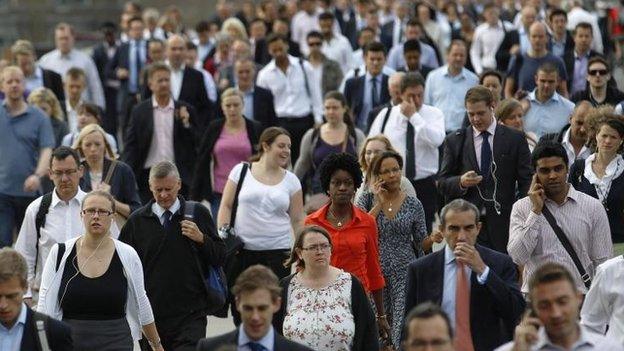FTSE 100 firms' pension deficit soars, says LCP
- Published

Pension schemes are still under strain
The combined pension funds deficit for companies in the FTSE 100 has seen huge increases in the past year, according to pensions expert LCP.
LCP, in its annual report on the pensions market, said that by the end of July, the deficit was an estimated £46bn, as against £25bn a year earlier.
And this month, the deficit has widened further to £63bn, LCP told the BBC.
The position has deteriorated because of lower bond yields, with a sharp fall after the UK's vote to leave the EU.
But sterling's fall after the Brexit result has partly offset this effect, LCP said.
'Ridden out Brexit'
Falling bond yields cause problems for pension funds, because they reduce the amount of income available from investments.
Bond yields have fallen even further this month, in the wake of the Bank of England's decision to cut interest rates from 0.5% to 0.25% and step up its bond-buying programme in an effort to stimulate the UK economy.
However, at the same time, the fall in the value of the pound has meant that overseas investments by pension funds are worth more in sterling terms.
LCP added that companies had also used interest rate hedging to negate much of the impact of falling bond yields.
"FTSE 100 companies seem to have ridden out Brexit reasonably well, reflecting the level of protection that many put in place against fall interest rates," the report said.

FTSE 100 companies briefly had a combined pension surplus in February
However, LCP added that Brexit, along with the collapse of department store chain BHS and the potential sale of Tata Steel's UK operations, had "highlighted the significance of corporate pension liabilities".
Since both firms were suffering because of underfunded pension schemes, their plight illustrated "the impact that a large defined-benefit scheme can have on a UK company".

Pension schemes explained
Final-salary scheme: Guaranteed pension based on earnings at end of your career and length of service. Also known as defined-benefit schemes
Career average scheme: Guaranteed pension based on your average pay over your career
Defined contribution scheme: Determined by contributions and investment returns. Usually worth less than final-salary pensions. Savings used to buy an annuity, or retirement income - until now

Bob Scott, partner at LCP told the BBC that UK companies should be in a strong position to fund their pension liabilities, given that they are currently paying high levels of dividends.
"If they can pay afford to pay out in a single year, dividends that are 25% more than the deficit, then they can manage their pension funding over the period," he said.
"I think there is going to be some attention focused on the level of dividends for companies that have large pension deficits."
He added that higher funding of defined benefit schemes would mean that pensions of those currently in work would tend to lose out relative to those who had retired.
"If companies are made to pay even more money into their defined benefit pension schemes, that increases the gap between current employees most of whom have a defined contribution scheme and former employees many of whom who have defined benefits," Mr Scott said.
'More closures'
The position has worsened since February, when FTSE 100 companies briefly had a combined pension surplus for the first time in seven years because of a fall in liability values.
But in the ensuing months, "liability values increased again and earlier gains were more than offset".
"None of the FTSE 100 companies we have analysed provide traditional final-salary pensions to new employees and only two continue to provide any form of defined-benefit pension provision as standard to new recruits," said LCP in its Accounting for Pensions 2016 report.
"These are Diageo and Johnson Matthey, which both provide cash balance schemes."
However, 57 FTSE 100 companies still allow at least some employees to pay into existing defined-benefit schemes.
"Legal & General and Marks and Spencer were the only companies to announce they would be closing their schemes to future accrual, or proposing to do so, since last year's report," said LCP.
But it added: "We expect to see many more pension scheme closures announced in the coming months and years - unless something is done to make pensions more affordable."